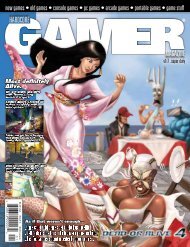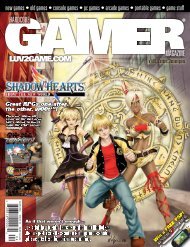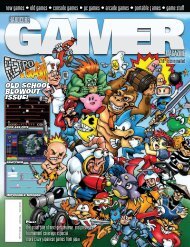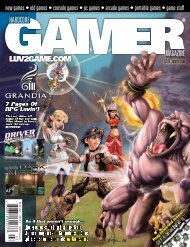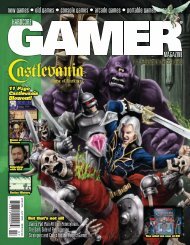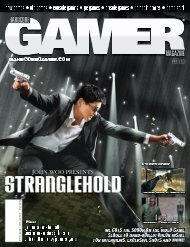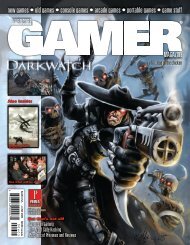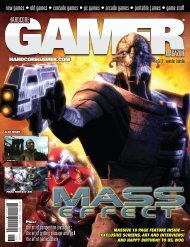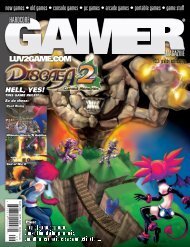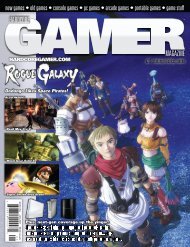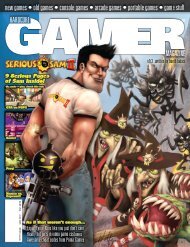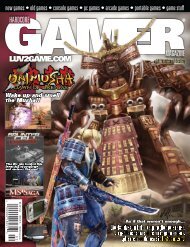Volume 2 Issue 5 November 2006 Grand Theft Auto - Hardcore Gamer
Volume 2 Issue 5 November 2006 Grand Theft Auto - Hardcore Gamer
Volume 2 Issue 5 November 2006 Grand Theft Auto - Hardcore Gamer
You also want an ePaper? Increase the reach of your titles
YUMPU automatically turns print PDFs into web optimized ePapers that Google loves.
By Daniel Kayser of GameTrailers.com<br />
32_PREVIEW_UNDER COVER: THE NEXT GENERATION OF SPLINTER CELL<br />
The gaming industry is huge. The now-global business of video games has surpassed all<br />
expectations for what it could become when the rst titles hit the market over twenty<br />
years ago. At its core, the gaming industry still strives to merge the worlds of creativity<br />
and technology while meeting the demands of business.<br />
The process of trying to meet those business demands while putting out high-quality, innovative<br />
games is truly fascinating. This is especially<br />
true when a company is attempting to<br />
take a successful franchise through a transition<br />
in console generations. Ubisoft is in this position<br />
with the upcoming Splinter Cell: Double Agent.<br />
With this title, Ubisoft hopes to introduce new<br />
features that will completely redene what the<br />
term “stealth gaming” means. Of course, since<br />
past games in the Splinter Cell series have all<br />
been enormously successful, any major changes<br />
could be viewed as inherently bad and a disruption<br />
of the formula. If the games remain the<br />
same for years on end, however, players eventually<br />
will grow tired of them.<br />
The team working on Double Agent in Shanghai,<br />
China, is well aware of the enormity of the<br />
task set before them. “We were huge fans of<br />
the Splinter Cell series, but at the same time,<br />
when approaching a fourth installment, we felt<br />
a huge pressure to move forward, to make the<br />
series evolve,” says Daniel Roy, Producer on<br />
Double Agent for the Xbox 360. “That’s the kind<br />
of thinking that brought us to the ‘Double Agent’<br />
concept: it has allowed us to respect the core<br />
values of the series — stealth, tension, political<br />
intrigue — and yet bring an element of innovation<br />
and change to the game.”<br />
Innovation and change can’t happen overnight<br />
in the big business of games. It takes time and<br />
manpower, especially when dealing with the<br />
next gen consoles. For instance, concept work<br />
on Splinter Cell: Double Agent began immedi-<br />
HARDCORE GAMER MAGAZINE_VOLUME 2_ISSUE 5_CALL CHUCK<br />
ately after Pandora Tomorrow hit the shelves<br />
in 2004. Production on the game itself began<br />
in early 2005. In total, nearly 350 people have<br />
worked on Splinter Cell: Double Agent, including<br />
its current-gen, next-gen, online, and ofine<br />
components. The single player campaign on<br />
Xbox 360 version alone has employed approximately<br />
a hundred fty people.<br />
The stated goal of Double Agent is to push Splinter<br />
Cell into the next generation. Daniel Roy<br />
explains, “Even though we added a lot to the<br />
Splinter Cell core experience in Double Agent,<br />
we’ve been fortunate to be able to rely on a<br />
lot of past technological and gameplay accomplishments.<br />
We already knew how to create a<br />
visually stunning game, and also how to create<br />
situations in-game that would be lled with tension.<br />
I would say that it’s both the positives and<br />
negatives that drove us forward when creating<br />
Double Agent: we wanted to make a game that<br />
would not rest on its laurels, and would push the<br />
envelope in terms of content and variety. With<br />
such a good series as Splinter Cell, it would have<br />
been easy to just do ’Chaos Theory 2’.” For that<br />
matter, such a game probably would have sold a<br />
solid million copies. Whether anyone still cared<br />
about Splinter Cell by the time Ubisoft trucked<br />
out a hypothetical Chaos Theory 4 is a different<br />
prospect entirely.<br />
The initial target for achieving a feeling of true<br />
advancement in Splinter Cell was with the new<br />
game’s storyline. So as soon as Double Agent<br />
begins, series hero Sam Fisher is immediately<br />
exposed to a life-altering tragedy: the death<br />
of his daughter Sarah, a relatively obscure supporting<br />
character in the previous Splinter Cell<br />
titles. Despondent, Sam wants to take on a mission<br />
more dangerous and all-consuming than<br />
HARDCORE GAMER MAGAZINE_VOLUME 2_ISSUE 5_CALL CHUCK<br />
anything he dared handle before. His cell’s commanding<br />
ofcer, Lambert, offers a mission more<br />
deadly then anything that they have tackled<br />
before: inltrating an enemy terrorist cell and<br />
taking it down from within.<br />
It sounds a little cliche when it’s simply spelled<br />
out like that, but the changes become more<br />
compelling when you consider how they’re<br />
going to impact gameplay. Double Agent’s<br />
Sam Fisher has become a hardened and<br />
inherently unpredictable man, so his decisions<br />
can truly be whatever you want.<br />
He’ll frequently be tasked with carrying<br />
out horric orders that the old Sam Fisher<br />
could have thought about accepting.<br />
This change in Sam’s character<br />
is all part of the core strategy of expanding<br />
the franchise. Changing the lead<br />
character’s circumstances likewise changes the<br />
player’s circumstances, and opens up new situations<br />
for a player to explore. It is, of course,<br />
a risky choice; gamers have had three titles to<br />
grow close to the old Sam Fisher, and may ultimately<br />
be uninterested in or even outraged by<br />
the changes to the character.<br />
“When we started Double Agent, we knew<br />
that people would expect more from the<br />
latest Splinter Cell than pretty graphics,”<br />
says Roy. “We felt that upping the resolution<br />
of our textures would not be enough<br />
to really mark the change of generations.<br />
So we spent a lot of time thinking about<br />
what “next generation” means for all aspects<br />
of our game. We wanted the story<br />
to be more ambitious, the presentation<br />
to be more dramatic, the gameplay to be<br />
more varied and intense, and the tension<br />
to be upped a notch. Oh, and of course,<br />
33_PREVIEW_UNDER COVER: THE NEXT GENERATION OF SPLINTER CELL



